Contents
I am passionate about discovering natural methods to safeguard my garden from pests and diseases. That’s why I am excited to discuss neem oil for plants. This natural pesticide has been a reliable solution for centuries in South Asia and is now cherished globally for its remarkable benefits.
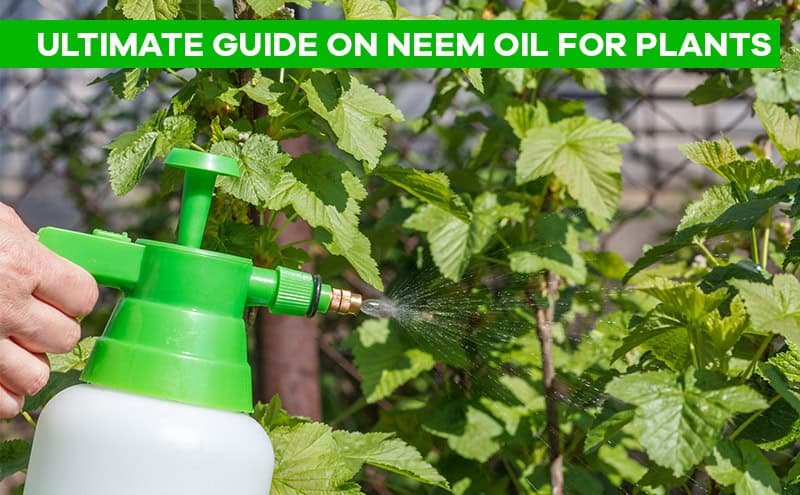
In this post, we will look into some amazing miracles of Neem oil spray for plants and gardens. We will also learn what is Cold Pressed and Heat pressed neem oil and which neem oil works best for your gardening needs. Plus we will also learn how to use neem oil in your garden with some of the tested and most effective formulae or combinations.
Key Takeaways
- Neem oil is a natural pesticide from the neem tree, found in South Asia.
- It has azadirachtin, which stops insects from eating, mating, and reproducing.
- Neem oil fights off insects and diseases, keeping your plants safe.
- Make a spray by mixing neem oil with water and a bit of liquid soap.
- Neem oil is safe for pets and beneficial insects when used right.
- #1 BEST PURE NEEM OIL FOR PLANTS: Zuprime Neem Oil concentrate is your go-to neem oil spray for indoor ornamental plants as well as neem oil spray for outdoor ornamental plants. It’s made with 100% cold pressed high quality organic neem oil your plants need for a shiny glow.
- 100% COLD PRESSED NEEM OIL: Unlike other neem oil spray for plants that include mixtures & vegetable oils in their concentrates, this 100% pure neem oil comes directly from the Indian neem plant and is 100% cold-pressed from the neem nut.
- Protect your oasis with Captain Jack’s Neem Max Concentrate; this multipurpose product acts as a 4-in-1 insecticide, fungicide, miticide and nematicide
- Captain Jack’s Neem Max Concentrate is approved for organic gardening; Cold Pressed Neem Oil is a plant based active ingredient that is effective in preventing and controlling diseases and pests in your garden
What is Neem Oil?
Neem oil is a vegetable oil extracted from the Miracle Tree – the Neem Tree. The botanical name of the neem tree is Azadirachta indica. Azadirachtin and Nimbin found in neem oil are the two major compounds responsible for their antibacterial and anti-fungal actions.
Neem oil is a natural product made from a plant. It’s popular among gardeners for fighting pests and diseases. It comes from the seeds of the neem tree (Azadirachta indica), found in tropical areas like India and Sri Lanka.
Origins of Neem Oil
The neem tree is called “Nature’s Pharmacy” because of its long history in medicine and farming. Its parts have been used to cure sicknesses and keep pests away from crops. Neem oil, made from the seeds, is a strong natural pesticide and fungicide for organic gardens.
The neem tree is native to the Indian subcontinent and can be easily grown at a home gardening level even in large containers. Before discussing which neem oil you should purchase for the best efficacy in gardening, let’s explore its best uses for plants and gardening.
Composition and Extraction Process
Neem oil is full of bioactive compounds, with azadirachtin being key for fighting insects. Azadirachtin is most in neem seeds, making them the best source for oil.
To get high-quality neem oil, seeds are pressed without heat or chemicals. This cold-pressing keeps the oil’s natural goodness. This type of oil is ideal for organic gardens.
After pressing, the oil is cleaned to remove seed bits. This clarified oil has less azadirachtin but still fights pests and diseases well.
| Neem Oil Type | Extraction Method | Azadirachtin Content |
|---|---|---|
| Cold-Pressed Neem Oil | Mechanical pressing without heat or solvents | Higher |
| Clarified Hydrophobic Neem Oil | Processed to remove seed residue | Lower |
When picking neem oil, choose cold-pressed and pure products for best results and safety. Stay away from diluted or chemical-added oils, as they can harm your plants or helpful insects.
The neem tree is full of natural compounds used for centuries to protect plants and aid growth. Neem oil shows how nature offers sustainable solutions for gardening and farming.
How Neem Oil Works as a Natural Pesticide

Neem oil is a powerful natural way to keep pests away from your plants. It targets pests at various stages of their life cycle. This stops them from eating, mating, and reproducing. When insects touch the plant, neem oil covers their bodies, suffocating them.
Using neem oil for pest control has many benefits. It goes into the plant and spreads throughout, keeping insects away. This keeps your plants healthy and safe from future pests.
Neem oil also affects insects’ hormones. It slows down their growth and stops larvae from changing into adults. This stops infestations from getting worse. Neem oil is a great choice for gardeners who want to avoid harsh chemicals.
Neem oil is a true gift from nature, offering a safe and effective way to protect our plants from destructive pests. Its unique mode of action not only eliminates existing infestations but also helps to prevent future outbreaks, ensuring the long-term health and vitality of our gardens.
With neem oil, you can keep your garden pest-free without using harmful chemicals. It’s safe for beneficial insects and the environment. Using neem oil means you’re taking care of your plants in a natural way.
Benefits of Using Neem Oil for Plants
I always look for natural ways to care for my plants. Neem oil is a top choice for me because it’s safe for the planet and fights pests well. It works as a natural pesticide and fungicide, making it key to my pest control plan.
Eco-Friendly and Non-Toxic
Neem oil is great for my garden because it’s natural. It comes from the neem tree and breaks down easily, leaving no harmful residues. This makes my garden safer for my family and the local wildlife.
It’s safe for humans, pets, and wildlife when used right. But, be careful near water because it can harm fish and other aquatic animals.
Versatile Pest Control
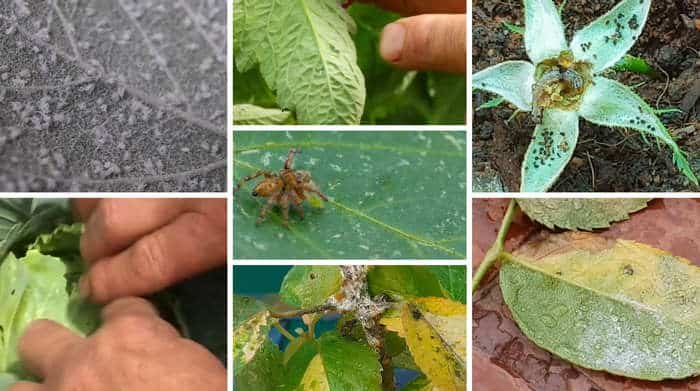
Neem oil is by far the best organic pesticide available worldwide. It has an excellent safety profile and is effective against a wide range of pests. It is a broad-spectrum pesticide that targets pests such as aphids, mealybugs, whiteflies, caterpillars, leaf miners, fungus gnats, thrips, mites, greenflies, grasshoppers, and other scale insects. Neem oil is effective against pests in all lifecycle stages, including adults and larvae. It stops insects from eating and reproducing by messing with their hormones. It can control pests like:
- Aphids
- Whiteflies
- Spider mites
- Mealybugs
- Fungus gnats
- Thrips
- Leaf miners
It kills over 200 types of insects at every stage of life. This makes it a powerful broad-spectrum pesticide against all kinds of pests.
Fungicidal Properties
Neem oil possesses antibacterial, antiviral, and antifungal properties that benefit both plants and humans. It is also used for various skin and hair issues in humans and pets. Additionally, neem oil is effective against slugs and snails, which can cause significant damage to your garden. Neem oil also fights fungal diseases in plants. It can prevent and treat issues like:
- Powdery mildew
- Black spot
- Rust
- Anthracnose
- Leaf spot
Using neem oil in your plant care routine keeps pests and diseases away. This helps your plants grow healthier and stronger.
| Benefit | Description |
|---|---|
| Eco-Friendly | Natural, biodegradable, and non-toxic to humans and pets |
| Versatile Pest Control | Effective against over 200 species of insects at all life stages |
| Fungicidal Properties | Prevents and treats various fungal diseases like powdery mildew and black spot |
I have been using cold-pressed neem oil for 10 years and it has helped my plants to the greatest extent. It’s a natural way to care for your plants and keep pests and diseases away.
Methods of Neem Oil Extraction
The quality, composition, and efficacy of neem oil depend significantly on the method of extraction:
Heat Pressing Method
This method involves using heat to crush or press the seeds to extract oil.
Solvent Extraction Method
This method uses a solvent like alcohol to extract neem oil. Solvent-extracted neem oil is usually lower in quality, as it is turbid and contains significant amounts of water and metals, with lower concentrations of azadirachtin and nimbin.
Cold Press Method
Cold-pressed neem oil is extracted without applying heat and is considered the best and most effective source of neem oil. When purchasing neem oil, ensure it is cold-pressed by checking the method of extraction mentioned on the bottle or product description.
- #1 BEST PURE NEEM OIL FOR PLANTS: Zuprime Neem Oil concentrate is your go-to neem oil spray for indoor ornamental plants as well as neem oil spray for outdoor ornamental plants. It’s made with 100% cold pressed high quality organic neem oil your plants need for a shiny glow.
- 100% COLD PRESSED NEEM OIL: Unlike other neem oil spray for plants that include mixtures & vegetable oils in their concentrates, this 100% pure neem oil comes directly from the Indian neem plant and is 100% cold-pressed from the neem nut.
Neem Oil for Plants: Insecticidal Applications
As a gardener, I’ve found neem oil to be a powerful tool against many garden pests. It’s great for fighting aphids, whiteflies, spider mites, and more. What’s best about neem oil is how it stops insects from feeding and reproducing. This makes it a top choice for long-term pest control.

Controlling Common Garden Pests
Neem oil works against over 200 types of insects. I’ve used it to fight aphids, mites, and more in my garden. It stops pests from eating my plants and keeps them healthy.
Using neem oil regularly keeps pests away. This means I don’t have to use harsh chemicals often. It’s a natural way to protect my garden.
Effectiveness Against Various Insect Life Stages
Neem oil targets insects at all stages of their life. It’s most effective against young ones, killing eggs and stopping the life cycle. This helps keep my garden healthy.
It also works on adult insects by stopping them from eating and reproducing. This reduces the pest population and prevents future problems. I’ve seen great results with spider mites, killing both adults and stopping them from reproducing.
| Pest | Life Stage Affected | Application Frequency |
|---|---|---|
| Aphids | Eggs, Nymphs, Adults | Every 7-10 days |
| Spider Mites | Eggs, Nymphs, Adults | Every 7-10 days |
| Whiteflies | Eggs, Nymphs, Adults | Every 7-10 days |
| Scale Insects | Crawlers, Adults | Every 7-10 days |
Consistency is key with neem oil. Applying it every 7-10 days keeps pests under control. This approach saves time and keeps my garden healthy and beautiful all season.
Using Neem Oil as a Fungicide
Neem oil comes from the neem tree and is a strong fungicide, besides fighting insects. As a gardener, I’ve seen how neem oil keeps fungal diseases away and treats them. It keeps my plants healthy and strong.
Powdery mildew is a common problem I face, spreading fast and weakening plants. Using neem oil has stopped this disease in its tracks. Studies show neem oil worked wonders on lilac bushes, keeping them safe from powdery mildew all season. It even beat the usual treatment, Benlate, on hydrangeas in greenhouses.
Preventing and Treating Fungal Diseases
Neem oil doesn’t just fight powdery mildew. It also stops and treats other fungal diseases like:
- Black spot
- Rust
- Sooty mold
- Leaf spot
- Root rot
Regular use of neem oil keeps my plants safe from these diseases. It stops fungal spores from growing and spreading. This stops the disease from getting worse. It doesn’t cure infections, but it keeps them from spreading.
Studies show neem oil is really good against fungal diseases. For example, it stopped 90% of bean rust before the plant got infected. Also, neem leaf extract blocked a fungus from making aflatoxin, a dangerous toxin, in tests in Louisiana.
| Fungal Disease | Neem Oil Effectiveness |
|---|---|
| Powdery Mildew | 100% control on hydrangeas in greenhouses |
| Bean Rust | 90% control when applied before fungus exposure |
| Aflatoxin Production | Inhibited by neem leaf extract in experimental trials |
Adding neem oil to my garden care has changed the game for fighting fungal diseases. This natural fungicide has made my plants healthier and more resilient against fungal threats.
Is Neem Oil Safe for Beneficial Insects?
Unlike chemical pesticides, neem oil does not affect beneficial pollinators such as butterflies and honeybees, which are crucial for a productive garden. Protecting our gardens from pests is a big concern. Neem oil is a natural pesticide that fights many insects and diseases. But is it safe for the good bugs like ladybugs, predatory mites, and bees?
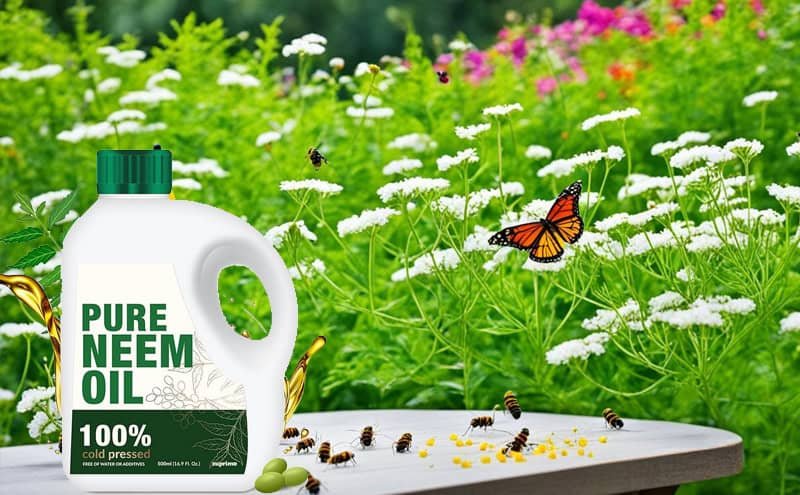
Good news: neem oil is usually safe for beneficial insects when used right. It targets pests that eat leaves, not pollinators like bees and butterflies. This makes neem oil a great choice for garden safety.
But, some beneficial insects like caterpillars and larvae can be harmed by neem oil. To reduce risks, apply neem oil in the early morning or evening. Don’t spray during midday when bees and ladybugs are out foraging.
When used properly, neem oil leaves no lasting residue as it washes away with rain and is broken down by ultraviolet rays.
Here are some key points to keep in mind when using neem oil:
- Always mix concentrated neem oil with water as directed to avoid harming bees and other pollinators.
- Spray neem oil in the evening or early morning when beneficial insects are least active.
- Avoid direct spraying of neem oil on beneficial insects like ladybugs, predatory mites, and bees.
- Use neem oil with caution on host plants of larval butterflies to protect the caterpillars.
By following these guidelines, you can control pests and protect beneficial insects. These insects are key to a balanced garden ecosystem. Using neem oil responsibly helps keep your garden safe for both plants and beneficial insects.
Preparing Neem Oil Spray for Plants
Making your own neem oil spray for plants is easy and effective. It helps protect your garden from pests and diseases. With the right ingredients and tools, you can make a strong solution. This will keep your plants healthy and strong.
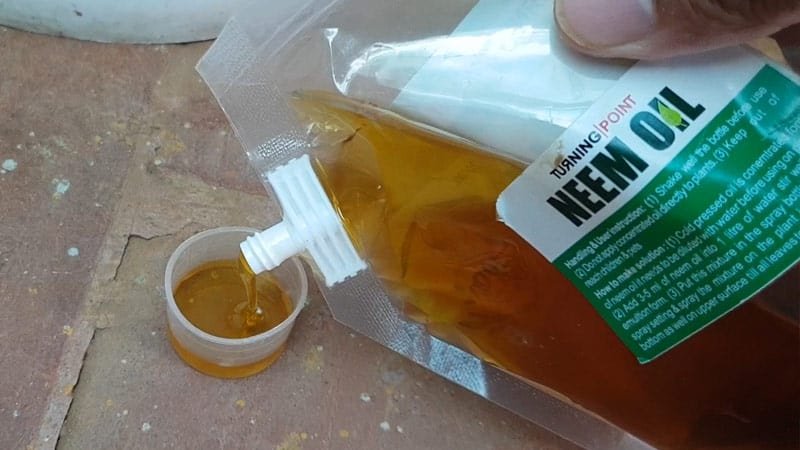
Ingredients and Equipment Needed
To create your neem oil spray for plants, you’ll need these items:
- Pure, cold-pressed neem oil
- Mild liquid soap or emulsifier (like castile or insecticidal soap)
- Warm water
- Measuring spoons
- A clean spray bottle or garden sprayer

When picking a garden sprayer, think about your garden’s size and how much you need. Some top choices include:
| Sprayer | Capacity |
|---|---|
| Hydrop | 2 Liters |
| Metaspray | 7 in 1 Spray Gun |
| Sprinklers | 2 Liters |
| Popspray | 1.5 Liters |
- HIGH EFFICIENCY: This sprayer saves labor time and attains 3 to 4times more efficiency than a manual sprayer. this sprayer can be operated continuously for up to 4 hours and spray 400liter -500liter of liquid . the surprise is that it only consumes 0.3 kwh of electricity and can attain excellent atomization result.
Step-by-Step Mixing Instructions
Here’s how to mix your neem oil spray:
- Decide on the neem oil concentration you want for your plants. Common levels are 0.5-1%, or even 2% for more intense needs.
- In a clean spray bottle or sprayer, put in the right amount of warm water. For a 1-liter mix, use 1 liter of warm water.
- Add the needed neem oil to the water. For a 1-liter mix at 0.5% strength, put in 5 ml of neem oil.
- Include a bit of mild liquid soap or emulsifier to help the neem oil blend with the water. For a 1-liter mix, use 1-2 ml of soap.
- Close the spray bottle or sprayer tightly and shake it hard for 30-60 seconds. This mixes the ingredients well.
It’s important to use the neem oil spray right away, as its effectiveness goes down over time. Don’t make big batches, prepare only what you need for each use.
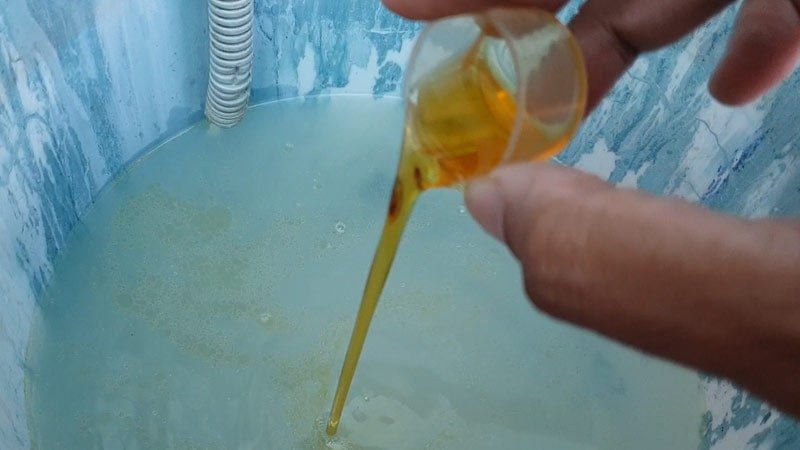
Before using the neem oil spray on all your plants, test it on a small part of one plant first. This checks for any bad reactions. It helps you avoid harming your plants while still using this natural pest control.
Applying Neem Oil to Plants
Using neem oil for plants is effective against pests and diseases. Knowing how to apply it is crucial for the best results. Whether fighting pests or preventing diseases, the right application and timing are key.
Foliar Spray Techniques
Applying neem oil as a foliar spray is common. Make sure to cover both sides of the leaves. Use a spray bottle or pressure sprayer for even coverage.
Hold the nozzle 6-8 inches from the plant and move it in a sweeping motion. This covers all parts of the plant well.
Apply the spray in the early morning or late evening. This reduces the risk of foliage burn and protects beneficial insects like bees.
Performing a Patch Test
Mixing thoroughly before use is crucial. Perform a patch test by spraying a small amount on one or two leaves and waiting a couple of hours to check for wilting or burning. If the patch test is successful, you can safely apply it to your entire garden.
Frequency of Use
Depending on pest severity, spray neem oil twice a week during the pest eradication phase. Once pests are under control, reduce application to weekly for one or two months, and then switch to once every 15 days as a preventive measure.

Soil Drench Method
The soil drench method is another way to use neem oil. Mix it with water and apply it to the soil around the plant. The plant absorbs the solution, providing protection against pests and diseases.
Follow the product label for the right mix. Pour the mixture slowly around the plant’s base, making sure the soil soaks it up. This method is great for root pests and soil diseases.
Frequency and Timing of Application
How often to apply neem oil depends on the pest or disease, plant type, and environment. Generally, apply every 7 to 14 days for control or prevention. Heavy infestations might need more frequent applications.
| Pest or Disease Severity | Application Frequency |
|---|---|
| Light infestation or preventative measure | Every 14 days |
| Moderate infestation | Every 7 to 10 days |
| Heavy infestation | Every 5 to 7 days |
Don’t apply neem oil in extreme temperatures. It can stress plants. Young or dehydrated seedlings and tender-leaved herbs like basil and parsley should be treated carefully.
For indoor plants, follow the same guidelines. Regular checks for pests or diseases and applying neem oil can keep your plants healthy.
Consistency is key with neem oil. Adding it to your garden routine helps control pests, prevent diseases, and keeps plants healthy.
Precautions and Potential Side Effects
Neem oil is usually safe for plants, but we must be careful. It’s harmful if swallowed, so keep it away from kids and pets. Always wear gloves and avoid touching your skin or eyes when using it.
Using neem oil can harm plants if you use too much or in the sun. Always use the right amount and skip it when it’s very hot outside. This keeps your plants safe.
If you’re using neem oil on food plants like tomatoes, make sure it’s safe for them. Always check the label to be sure. This keeps you and your plants safe.
Patch Test: Before using neem oil on your whole garden, test it on a small plant first. This helps you see if there are any problems and adjust the amount if needed.
Some possible bad effects of neem oil on plants are:
- Leaf burn or yellowing
- Stunted growth
- Less fruit or flowers
- More sensitive to stress
| Safety Precaution | Importance |
|---|---|
| Keep away from children and pets | Prevents accidental ingestion and toxicity |
| Wear gloves during application | Minimizes skin irritation and allergic reactions |
| Follow recommended application rates | Reduces the risk of phytotoxicity and plant damage |
| Test on a small area first | Allows observation of adverse reactions before widespread use |
By being careful and aware of the risks, you can use neem oil safely. This way, you can protect your plants and the environment while enjoying its benefits.
Plants That Benefit from Neem Oil Treatment
Neem oil is a natural way to protect plants from pests and diseases. It’s safe for the environment and great for gardeners who want to avoid harsh chemicals. We’ll look at how neem oil helps vegetables, fruits, flowers, and houseplants.
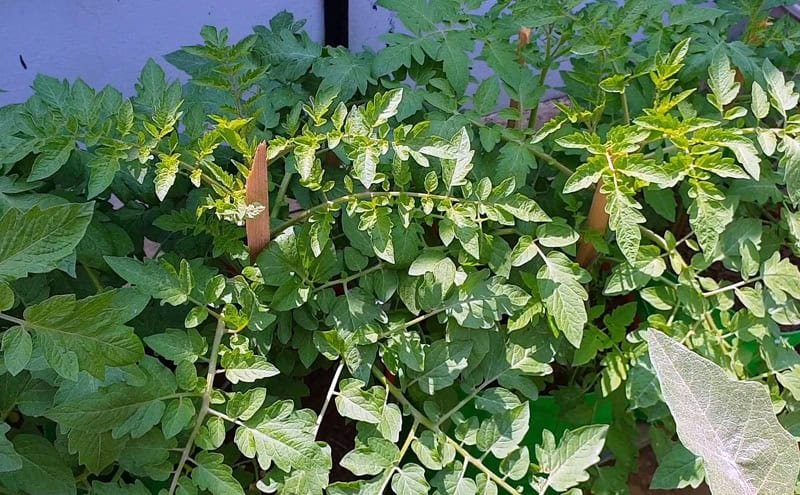
Neem Oil for Vegetables and Fruits
Neem oil fights pests and diseases in vegetable gardens and fruit trees. It keeps tomato plants safe from aphids, whiteflies, and spider mites. Peppers, cucumbers, and squash also benefit from it.
Fruit trees like citrus, apples, and peaches stay healthy with neem oil. It keeps insects and diseases away. Adding neem oil to your orchard care helps your fruit plants grow better.
Neem Oil For Ornamental Plants and Flowers
Neem oil also helps ornamental plants and flowers stay beautiful. Roses, marigolds, and chrysanthemums are some examples. It keeps these plants pest and disease-free, making your garden colorful and fragrant.
For indoor plants and houseplants, neem oil is useful too. But, be careful with how you use it and make sure there’s good air flow. With careful use, your indoor plants will stay healthy and pest-free.
| Plant Type Common Pests Controlled by Neem Oil | |
|---|---|
| Tomatoes | Aphids, whiteflies, spider mites |
| Peppers | Aphids, thrips, leafminers |
| Roses | Aphids, spider mites, black spot |
| Citrus Trees | Scale insects, mealybugs, leaf miners |
| Indoor Plants (Ficus, Pothos) | Spider mites, mealybugs, scale insects |
Neem oil is a strong, natural pesticide for many plants. Adding it to your plant care routine makes your garden healthy and pest-free. It shows the beauty and life of nature.
Integrating Neem Oil into Your Garden Maintenance Routine
As a dedicated gardener, I’ve found neem oil to be a game-changer. It keeps my garden healthy and pest-free. Using neem oil regularly helps prevent pests and diseases, making my garden sustainable.
Neem oil stops insects in their tracks with its active compound azadirachtin. This means fewer pests on my plants, reducing the need for harsh chemicals. It also fights fungal diseases like powdery mildew and black spot, keeping my plants strong.
Neem oil has become an essential part of my organic gardening toolkit, allowing me to maintain a beautiful, healthy garden without relying on harmful synthetic chemicals.
I use neem oil every 2-3 weeks during the growing season. I target times when pests are most active or when plants are at risk of disease. This approach has cut down on pests and diseases in my garden.
Neem oil also boosts soil health. It encourages good microbes, which helps roots grow strong and plants absorb nutrients better. My garden is now more resilient and full of life.
| Benefit | Impact on Garden |
|---|---|
| Disrupts insect life cycles | Reduces pest attacks and minimizes the need for chemical pesticides |
| Antifungal properties | Combats common fungal diseases like powdery mildew, black spot, and rust |
| Enhances soil health | Promotes beneficial microbial activity, leading to improved root development and nutrient absorption |
| Eco-friendly and non-toxic | Breaks down quickly in the environment, posing minimal risk to soil, water sources, and non-target organisms |
By mixing neem oil with other organic methods, like proper watering and pruning, I’ve made a thriving garden. Neem oil is a key part of my routine, helping my garden stay healthy and sustainable.
- PetraTools Garden Sprayer – Perfect for DIYers Seeking Professional Results: Our durable yet lightweight water sprayer, with a 52” hose and 16” wand, ensures comfortable extended use and excellent coverage, making it ideal for versatile liquids such as fertilizers, mulch glue, and pesticides.
Neem Oil vs. Other Natural Pesticides
There are many natural pesticides you can use to protect your garden, like neem oil, pyrethrin, insecticidal soap, and botanical insecticides. Each has its own strengths and weaknesses. The best choice depends on the pests and plants in your garden.

Neem oil is great because it works against many insects, such as aphids and spider mites. It stops insects from reproducing, helping control pests over time. It’s also safe for pets and kids because it’s not very toxic to mammals.
Comparison of Effectiveness and Safety
When looking at natural pesticides, consider these factors:
- Pyrethrin is strong against many insects but can harm bees and ladybugs more than neem oil.
- Insecticidal soaps work well against aphids but might need to be applied more often than neem oil.
- Horticultural oils are great for fighting pests like scale insects but can hurt some plants if not used right.
- Botanical insecticides, including neem oil, break down fast and are less toxic to mammals, making them a better choice than synthetic ones.
Even though natural pesticides are better for the environment, they can still harm beneficial insects if not used correctly. Always follow the instructions on the label and don’t spray pesticides on plants that are flowering.
| Natural Pesticide | Effectiveness | Safety for Beneficial Insects |
|---|---|---|
| Neem Oil | Broad-spectrum; disrupts insect life cycle | Generally safe when used as directed |
| Pyrethrin | Highly effective against many insects | Can be toxic to bees and ladybugs |
| Insecticidal Soap | Effective against soft-bodied insects | Safe for most beneficial insects |
| Horticultural Oils | Highly effective against scale and mites | Generally safe when used as directed |
The choice of natural pesticide depends on the pest problem, the plant being treated, and what you prefer. Think about each option’s effectiveness and safety to make a good choice for your garden.
Where to Buy High-Quality Neem Oil for Plants
When looking for the best neem oil for plants, I focus on quality and purity. I want my garden to get the best treatment that’s safe and effective. Cold-pressed, organic neem oil is my top choice for great results.
Online retailers like Amazon are great for finding a variety of neem oils for plants. I’ve found top-quality options by reading reviews and choosing reputable brands. Make sure to pick a pure, cold-pressed product without additives or chemicals.
Online Retailers and Garden Centers
Local garden centers and nurseries are also great for buying neem oil. The staff can give you advice based on your garden’s needs. You can also find neem oil concentrate to make your own spray at home. This lets you adjust the strength for your pest or disease problem.
- Protect your oasis with Captain Jack’s Neem Max Concentrate; this multipurpose product acts as a 4-in-1 insecticide, fungicide, miticide and nematicide
- Captain Jack’s Neem Max Concentrate is approved for organic gardening; Cold Pressed Neem Oil is a plant based active ingredient that is effective in preventing and controlling diseases and pests in your garden
- #1 BEST PURE NEEM OIL FOR PLANTS: Zuprime Neem Oil concentrate is your go-to neem oil spray for indoor ornamental plants as well as neem oil spray for outdoor ornamental plants. It’s made with 100% cold pressed high quality organic neem oil your plants need for a shiny glow.
- 100% COLD PRESSED NEEM OIL: Unlike other neem oil spray for plants that include mixtures & vegetable oils in their concentrates, this 100% pure neem oil comes directly from the Indian neem plant and is 100% cold-pressed from the neem nut.
Ensuring Cold-Pressed, Pure Neem Oil
Always check the label to make sure the neem oil is cold-pressed and pure, no matter where you buy it. Stay away from products with fillers or chemicals. These can harm your plants or lessen the neem oil’s effectiveness.
When shopping for neem oil, I look for these things:
- Cold-pressed extraction method
- 100% pure neem oil
- Organic certification (such as USDA Organic)
- Non-GMO verification
Buying high-quality, cold-pressed neem oil has really helped my garden. It’s a natural, eco-friendly choice that controls pests and diseases well.
By choosing the best neem oil for plants, you’ll help your garden stay healthy and vibrant.
Watch this video demonstrating How to Use Neem oil For Plants?
| Pest | Effectiveness of Neem Oil |
|---|---|
| Aphids | High |
| Spider mites | High |
| Mealybugs | Moderate |
| Whiteflies | High |
| Thrips | Moderate |
| Leaf miners | Low |
Neem oil is a great, eco-friendly way to fight pests and diseases in your garden. By knowing how to use it right, you can keep your plants healthy and strong.
Conclusion
Neem oil is a top choice for keeping pests and diseases away from your plants. It has over 100 active compounds, including azadirachtin, which fights pests well. Mixing 2-4 tablespoons of neem oil with a gallon of water and spraying it on your plants every 7-14 days helps keep your garden healthy.
This oil not only controls pests but also fights fungi when used every 7-10 days, especially in humid weather. It’s a must-have for gardeners who prefer organic methods over harmful chemicals. Its nitrogen content and soil microbial boost make your garden more fertile and lively.
Neem oil is safe for people and beneficial insects, making it great for the environment. Adding neem oil to your plant care routine is a big step towards a sustainable garden. Enjoy the benefits of neem oil and see your garden thrive with eco-friendly pest control and better plant health.
Frequently Asked Questions About Neem Oil for Plants
How often should I apply neem oil to my plants?
How often you apply neem oil depends on the pest or disease level. Usually, apply it every 7-14 days until the issue is fixed. For prevention, use it every 2-3 weeks during the growing season.
Can I use neem oil on edible plants like vegetables and herbs?
Yes, neem oil is safe for edible plants if used as directed. Always check the label to make sure it’s safe for food crops. Wash your produce well before eating it, and don’t apply neem oil close to harvest.
Is neem oil safe for beneficial insects like bees and ladybugs?
Neem oil is mostly safe for beneficial insects when used right. It targets pests that eat or suck on leaves, leaving bees and butterflies unharmed. Apply it in the early morning or evening to protect pollinators.
Can I mix neem oil with other pesticides or fungicides?
Mixing neem oil with other chemicals is not advised. It might reduce its effectiveness or cause bad side effects. Neem oil works best alone, following the recommended rates and instructions.
How long does neem oil remain effective after application?
Neem oil can last a few days to a week, depending on the weather, pests, and plant type. To keep your plants protected, reapply neem oil as the product label suggests or based on the pest or disease level.
Can I apply neem oil to plants during hot, sunny weather?
Avoid neem oil in hot, sunny weather to prevent plant damage. Apply it in the early morning or late evening to avoid foliage burn. These times have cooler temperatures and less intense sun.
How should I store neem oil, and what is its shelf life?
Keep neem oil in a cool, dry spot away from sunlight. It can last 1-2 years if stored right. Always check the label for storage tips and expiration dates.
Can I use neem oil as a soil drench for root-feeding pests?
Yes, neem oil works as a soil drench for pests like fungus gnats and nematodes. The plant absorbs the oil, protecting it from within. Follow the label for dilution and application when using neem oil as a soil drench.
Last update on 2025-04-26 / Affiliate links / Images from Amazon Product Advertising API




